Introduction
Understanding autism and navigating the testing and assessment process is pivotal for parent advocates striving to support children on the spectrum. In this article, we will explore strategies for parent advocates, educate ourselves on different tests used in the assessment process, discuss the importance of collaborating with professionals, highlight the significance of keeping records and tracking progress, and provide guidance on seeking professional guidance for autism diagnosis. By delving into these topics, we aim to empower parent advocates with the knowledge and resources they need to navigate the challenges of advocating for their children's well-being.
Strategies for Parent Advocates
Understanding autism and navigating the testing and assessment process is pivotal for parent advocates striving to support children on the spectrum. The journey begins with an individual assessment, recognizing that each child's autism is distinct.
A Board Certified Behavior Analyst (BCBA) conducts a thorough evaluation, laying the groundwork for tailored strategies that cater to the child's unique strengths and challenges. Goal setting follows, with precise, measurable objectives established to monitor progress.
This continuous evaluation ensures that strategies evolve in line with the child's development, fostering ongoing benefits. The process encompasses intake—gathering essential details about the child, which may include obtaining a diagnosis, followed by crafting a personalized plan based on comprehensive assessments.
Service implementation is then carried out, offering a spectrum of therapies designed to enhance communication, social interactions, and independence. A collaborative partnership between therapists and families is central to this approach, ensuring that interventions are aligned with the child's needs.
Recent research underscores the importance of early diagnosis, revealing that trained community-based providers can accurately diagnose autism in 82% of cases, which aligns with specialists' evaluations. This breakthrough can significantly reduce the long wait times and travel burdens families face, as early intervention is crucial for improving outcomes. Autistic parents, including those who participated in a study where ten autistic mothers shared their experiences, emphasize the systemic barriers they encounter in securing support. Their insights reveal the need for services that are more attuned to the unique experiences of autistic families, highlighting the importance of training developed by autistic adults that focuses on the positive aspects of autism. Parent advocates are empowered by these insights and training opportunities, enabling them to become more effective in their advocacy and support for their children, ultimately enhancing the well-being of the entire family.
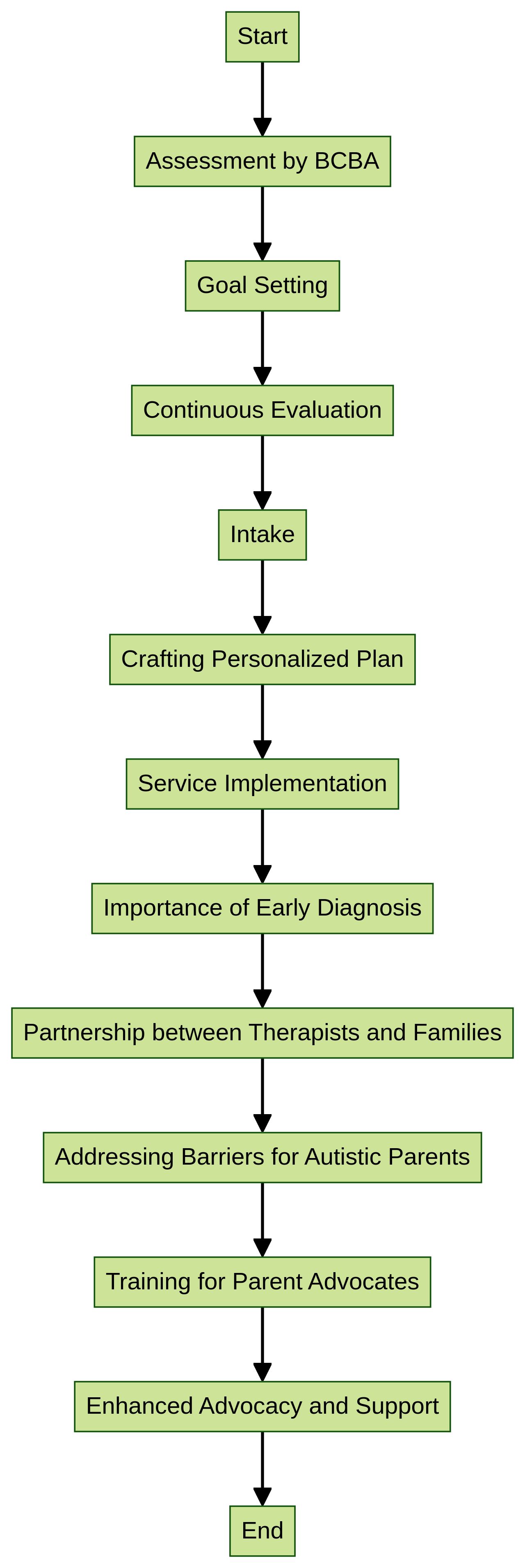
Educate Yourself on Different Tests
Understanding the myriad of assessments for autism is crucial for anyone supporting and guiding parents through their child's developmental journey. The Autism Diagnostic Observation Schedule (ADOS) is a key tool in this process.
This semi-structured assessment evaluates social interaction, communication, play, and creative use of materials, providing valuable insights for those with suspected autism spectrum disorders (ASD). It's tailored to the individual's language proficiency and consists of modules lasting approximately 30 minutes each.
The Mullen Scales of Early Learning (MSEL) is another integral test that gauges early cognitive and motor development, particularly useful for children of preschool age. Meanwhile, the Vineland Adaptive Behavior Scales (VABS) assess personal and social skills, which are vital for daily living.
Recent studies show that trained community-based providers can diagnose autism with an 82% agreement rate with specialists, highlighting the effectiveness of these tools and the importance of accessible training for primary care clinicians. This development is promising, considering the delays many families face in receiving a diagnosis—often taking over a year and requiring significant travel. With the median age of diagnosis currently over 4 years, despite the possibility of identification by age 2, enhancing understanding and efficiency in the assessment process is more important than ever. By delving into the structure and purpose of these assessments, one can better navigate the complexities of autism diagnosis, advocate for timely intervention, and foster hope for the families affected.
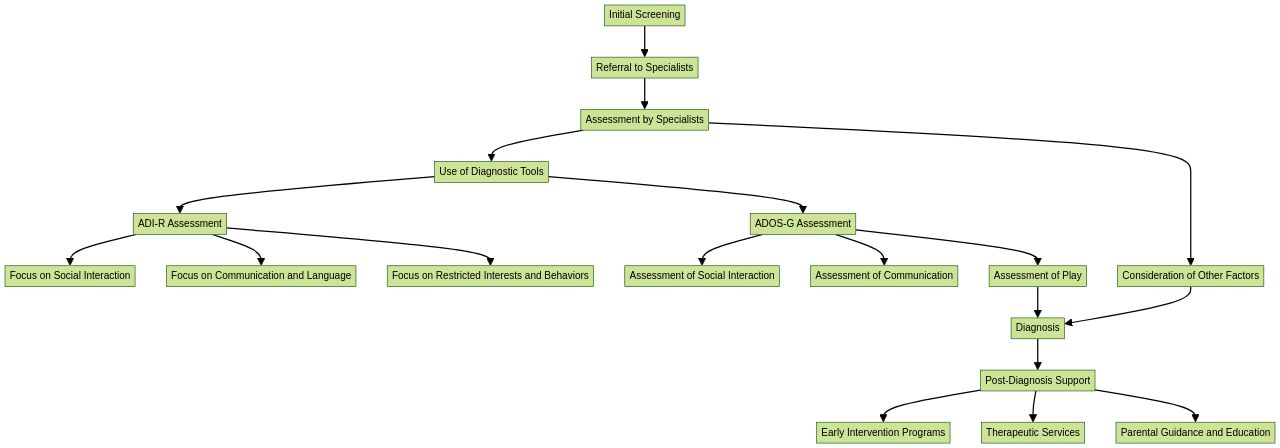
Collaborate with Professionals
Understanding the intricacies of autism and its impact on a child's development entails more than just interpreting test results; it involves a collaborative effort with a dedicated team of professionals. Engaging with psychologists, speech therapists, occupational therapists, and other healthcare providers, parents can gain a deeper insight into their child's unique needs.
Through this synergy, a child's abilities and challenges are not just assessed, but understood in the context of their overall development, paving the way for tailored intervention strategies that capitalize on strengths and address difficulties. The importance of such collaboration is evidenced by the success stories from various initiatives.
For instance, the joint efforts of FEMA's Disability Integration Coordinator and Autism Community Together (ACT) resulted in a supportive registration drive. This not only provided a secure environment for parents to receive assistance but also catered to the special needs of their children.
Similarly, research from the OHAIRE Group at the University of Arizona College of Veterinary Medicine highlights the positive impact of service dogs on children with autism and their families, showcasing the potential of unique, family-centered interventions. Recent advancements in training community-based providers to diagnose autism have shown promising results, with an 82% agreement rate with autism specialists. This breakthrough, as highlighted in a recent study published in Pediatrics, is a step towards reducing diagnostic delays and increasing access to early interventions. Such progress underscores the significant role of informed collaboration in enhancing the quality of life for children with autism and their families.
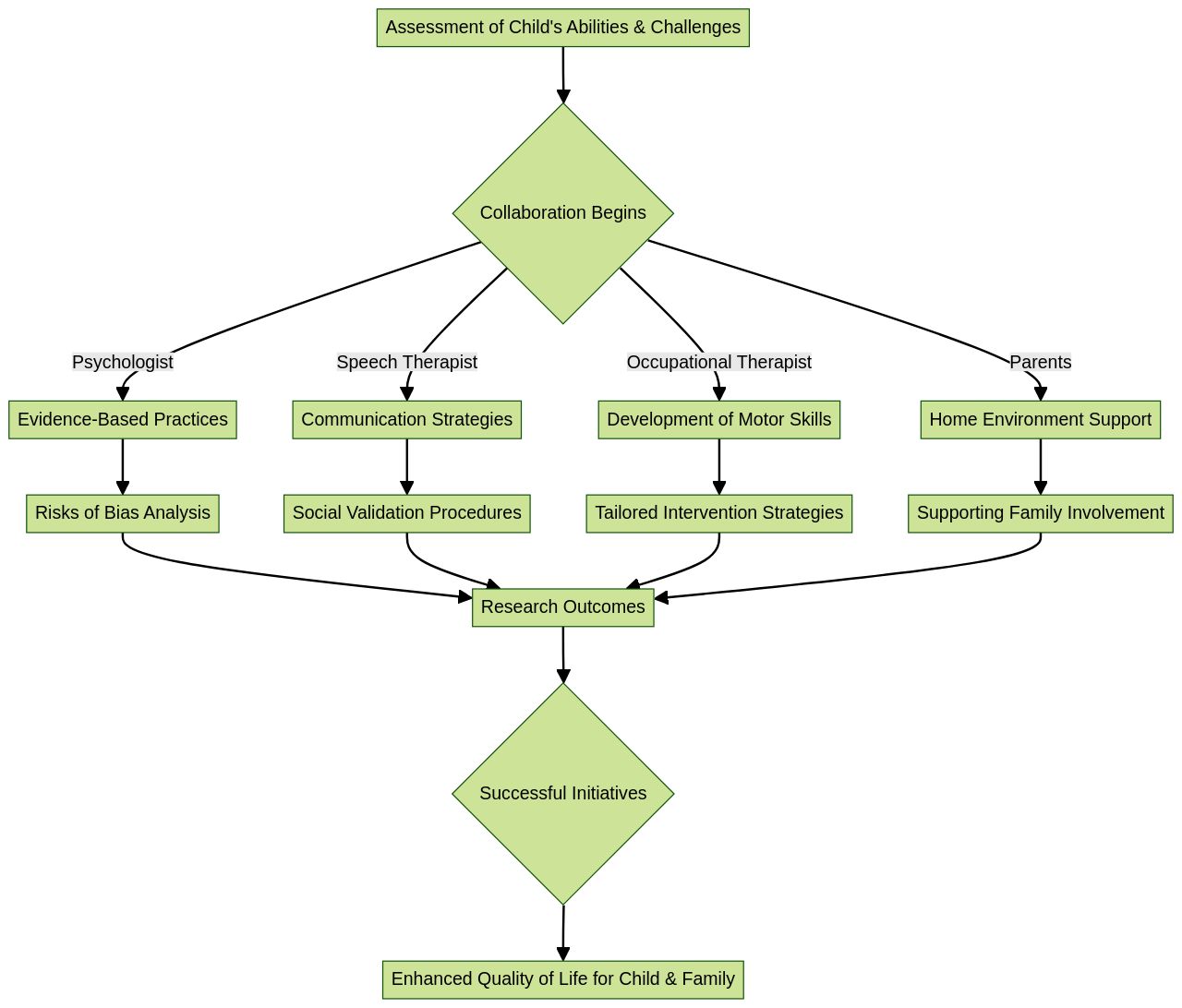
Keep Records and Track Progress
Diligent record-keeping is a cornerstone of effective advocacy for children on the autism spectrum. By maintaining a detailed history of assessments, including the dates, involved professionals, and the tests conducted, parents can better understand their child's developmental trajectory.
Such records illuminate progress and highlight areas requiring additional support or intervention. Tracking both the strengths and challenges of a child with autism is crucial, not only for personal insight but also for ensuring the provision of tailored services and accommodations.
Recent initiatives underscore the importance of such meticulous tracking. For instance, the CDC's Autism and Developmental Disabilities Monitoring Network has recently expanded its monitoring efforts to include cerebral palsy, emphasizing the value of systematic records reviews.
Similarly, the Interagency Autism Coordinating Committee's 2022 Summary of Advances in Autism Research highlighted the need for improved early screening and diagnosis of autism, further supporting the necessity of comprehensive record-keeping for early intervention. Moreover, community events and partnerships, like those created by NEXT for AUTISM, demonstrate the power of collaboration in raising awareness and creating employment opportunities for individuals with autism. These efforts not only support the autism community but also foster inclusion in the broader society. As noted by the Executive Director of the Bhatia Foundation, it's imperative for autistic individuals to be recognized as integral members of our communities, which starts with acknowledging their diverse needs and contributions. Therefore, parents' meticulous documentation of their child's growth and needs is a foundational step in advocating for their rightful place in society.
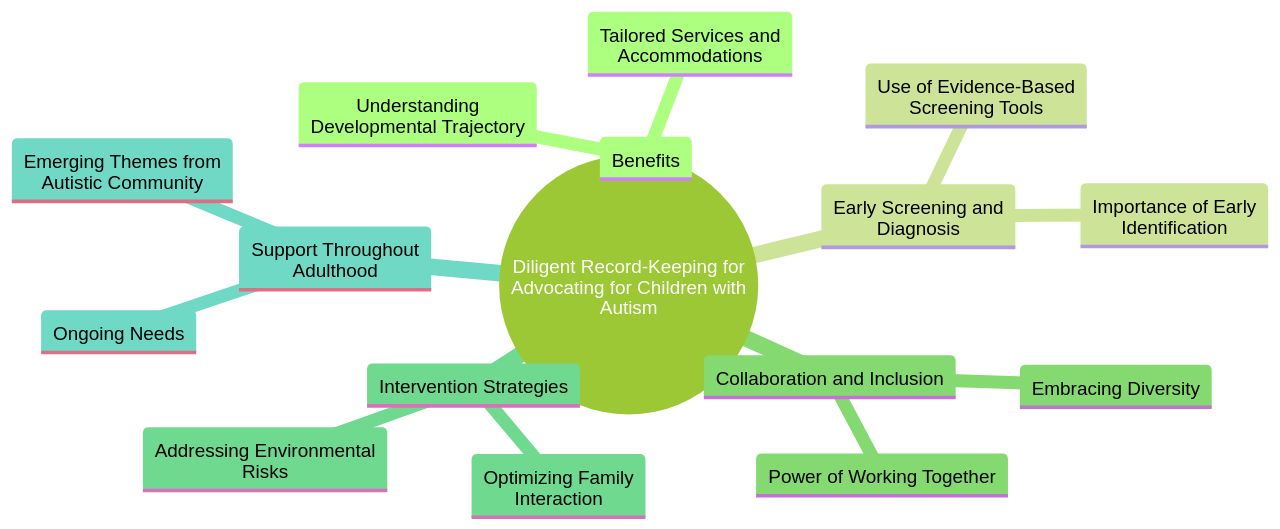
Seek Professional Guidance
Autism Spectrum Disorder (ASD) diagnosis is a collaborative effort, relying on detailed observations from parents and professional evaluations. The DSM-5 lays out specific criteria for ASD, and while many tools exist to assess the condition in children, reliance on a single tool is discouraged. Diagnosing ASD involves a combination of parental insights on their child's development and expert observations of the child's behavior.
For a comprehensive assessment, primary care providers may refer families to specialists like neurodevelopmental pediatricians or child neurologists. The ADI-R, a clinical instrument, is used to assess autism focusing on social interaction, communication, and repetitive behaviors, suitable for individuals with a mental age of 18 months and above. Recent studies underscore the effectiveness of specially trained community-based providers in diagnosing autism, with an 82% agreement rate with specialists.
This approach could significantly shorten the diagnostic journey for many families, bypassing long wait times and travel for specialist appointments. The median age for autism diagnosis is currently over 4 years, even though it can be reliably identified by age 2. Early diagnosis is crucial as it leads to timely intervention, which is known to improve outcomes.
Parents sometimes experience an 'inconclusive' diagnosis, which may reflect limitations in the testing process and the evolving understanding of autism's diverse characteristics. Adults beginning their diagnostic journey may find that traditional testing doesn't fully capture their experience, but there are ample resources to support them, including books, discussions with autistic individuals, and autism-focused podcasts. Genetic diagnosis can alleviate parents' self-blame and guilt and have a modest impact on their actions and life planning for their child, although it doesn't significantly alter parental identity or expectations for their child.
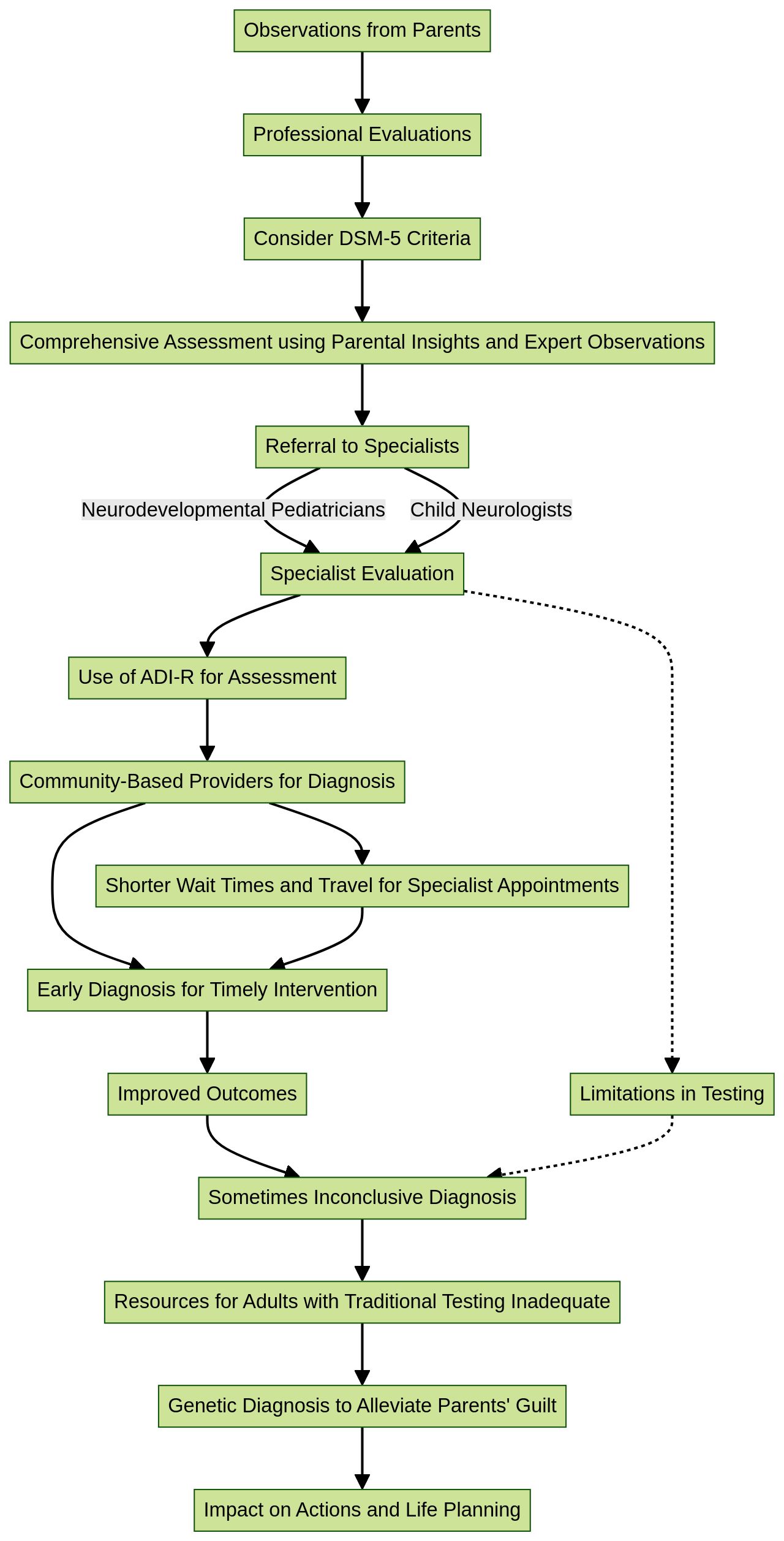
Conclusion
In conclusion, understanding autism and navigating the testing and assessment process is crucial for parent advocates striving to support children on the spectrum. By educating themselves on different tests, parent advocates can better navigate the complexities of autism diagnosis, advocate for timely intervention, and foster hope for the families affected.
Collaborating with professionals is also essential, as it allows parents to gain a deeper insight into their child's unique needs and pave the way for tailored intervention strategies. Diligent record-keeping is a cornerstone of effective advocacy, as it helps parents track progress, identify areas requiring additional support or intervention, and ensure the provision of tailored services and accommodations.
Lastly, seeking professional guidance is vital for an accurate ASD diagnosis, with a combination of parental insights and expert observations playing a crucial role in the assessment process. Early diagnosis leads to timely intervention and improved outcomes for children with autism. Overall, by empowering parent advocates with knowledge and resources, we can enhance the well-being of children on the spectrum and their families.




